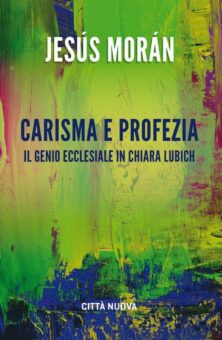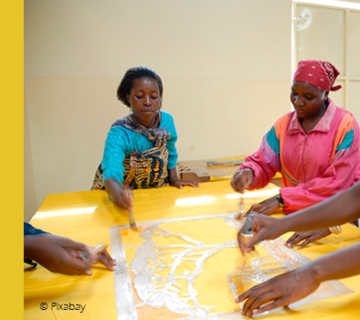“Charism and Prophecy” is the title of the new book by Jesús Morán, co-president of the Focolare Movement. It follows on his previous book, “Creative Fidelity – The challenge of making a charism a reality”. Morán offers in this text his reflection on Chiara Lubich’s “ecclesial genius”, starting from talks he gave on the subject over the past three years. We talk about it with the author.
 How did the idea for this book come about?
How did the idea for this book come about?
Since I had several texts that had not yet been published, I thought of honouring Chiara Lubich in the centenary year of her birth and, at the same time, I wanted to make an act of love to everyone in the Focolare Movement. Since I began several years ago to use the expression, “Chiara’s ecclesial genius,” I saw that many people liked it, that is, they grasped in it a synthetic concept that could define the marvellous synergistic unity between Chiara’s person and her charism, as “all one piece”. I am convinced that Chiara, in addition to having been endowed by God with an “ecclesial instinct” is, indeed, an “ecclesial genius”, in continuity with others in the Church who have opened new horizons, always inserted in the tradition that goes back to Jesus himself. It was right to study it more deeply during this centenary.
As you yourself have explained several times, the Focolare Movement, after its charismatic phase, is living its historical phase, the one you have defined as “a period of creative fidelity”. It is therefore the phase of giving Chiara’s prophecies concrete shape in the world today. What do you think is the main contribution that the Focolare Movement can make today to fulfil these prophecies in the ecclesial sphere, in the journey towards achieving “that they all may be one”?
When I say that we have entered the phase of the historical foundation of the Movement, in creative fidelity to the phase of the charismatic foundation, I do not intend to dialectically oppose the two phases. In fact, the charismatic foundation has also been historical and, therefore, the historical foundation has a charismatic element. But they are two different phases, with different emphases, which touch both the foundation and the form of things. There is no doubt that today the theme of actualizing the charism of unity acquires a particular poignancy and urgency. Creative fidelity should always be exercised, keeping in mind two principles: listening to the questions that God proposes to the world and listening to what God continues to tell us in the foundational nucleus of the charism. In my opinion, one of the questions that God poses to the Church that lives and acts within history is what we could summarize as “synodality”, which implies openness, communal decisions, being close to one another, being attentive to the dignity of the person, especially the most vulnerable. The Focolare Movement contributes to this ecclesial journey with a very special emphasis, which comes from the heart of its charism, that is, a vital and concrete experience of the Triune God who has an impact on history, without which synodality is reduced to a new organizational form deprived of the life of the Spirit.
And which of these prophecies still need more time and effort in order to be actualized?
I think that in order to live up to our true vocation in the Church, the members of the Movement must grow in the sensus ecclesiae, to have “the mind of the Church”. Not that they do not have it, but there is a need to grow, which means overcoming, once and for all, every attitude of self-referencing and reaching the maturity that all the recent Popes have asked of us. Moreover, we need to overcome any dualism between civil commitment and ecclesial commitment, looking at the model that we have always held as Christians: the figure of Jesus, the man-God, truly man and truly God.
In the light of the reflections you offer in your book, what would you like to say, from your heart, as we draw to the end of these six years in which you were co-president of the Focolare Movement?
I pray that God will give us the necessary graces to update the charism of Chiara Lubich in a vital and radical way. I think that we must begin again, reborn from the heart of the charism, from what we call “the Ideal”, and from there set in motion the necessary reforms so that the Movement, also as an institution, may better reflect the human-divine life that animates it. And rebirth means purification and conversion.
Edited by Anna Lisa Innocenti


 Italiano
Italiano Español
Español Français
Français Português
Português




Grazie Jesus della tua profonda intuizione del carisma che Dio ha dato a Chiara e che Chiara ci ha donato.
L’ultima frase dell’intervista la porto con me ogni momento.
Luciana Torino
Me encantó la entrevista. Me lleva a vivir radicalmente este hermoso Ideal que nos dejó Chiara. Siempre con Jesús en medio.
Trovo sempre molto interessante il pensiero di Jesus Moran soprattutto per la sua personale fedeltà creativa al carisma e perché con lucidità sa indicare nuove strade aiutandaci ad attualizzare il carisma stesso. Grazie
Je réfléchis à ce qu ‘a écrit Jesus Moran, et je me culpabilise dans le sens où j’ ai un mari et deux enfants et où je me sens incapable de faire passer la mission de Chiara auprès d’eux trois.
Depuis mes 19 ans, je vis dans l’esprit des focolari.
J’ai épousé Michel qui ne connaissait pas Jésus Christ.
Et je me sens incapable de lui faire vivre l’esprit par lequel je suis animée.
J’ai compris que je ne pouvais faire rentrer cette foi dans la famille comme cela.
J’ai donc vécu ma foi au seing de ma famille seule sans imposer quoi que ce soit.
Voir combien cela peut m’aider à continuer d’avancer et comprendre que mon mari et mes enfants ne vivent pas cette aide spirituelle, je vous avoue, me tracasse.
Je dois l’accepter. Je sens qu ‘on passe les uns et les autres à côté d*un échange impossible.
Je dois l’ accepter.